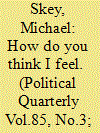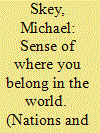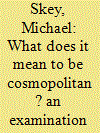|
|
|
Sort Order |
|
|
|
Items / Page
|
|
|
|
|
|
|
| Srl | Item |
| 1 |
ID:
135885


|
|
|
|
|
| Summary/Abstract |
Current debates around immigration are informed by hierarchies of belonging, with some groups seen to belong more, and therefore deserve more, than others. This link between belonging and entitlement has been predominantly analysed in relation to struggles over access to key material benefits, such as jobs, housing, healthcare and so on. This paper will argue that these struggles also point to the continuing relevance of nationhood to many people's sense of self, community and place and the value that comes from being positioned, and recognised, as part of a group that lies at the heart of national life and culture. In other words, the ‘politics of immigration’ is about the anxieties and concerns of those who no longer feel ‘at home’ in what they consider to be ‘their’ country.
|
|
|
|
|
|
|
|
|
|
|
|
|
|
|
|
| 2 |
ID:
099846


|
|
|
|
|
| Publication |
2010.
|
| Summary/Abstract |
The significance of national forms of imagination and organisation has been increasingly questioned in an era of rapid globalisation. While theoretically stimulating, those who stress the importance of global mobility and sociability sometimes overlook what well-established, "thick" attachments to the nation offer to disparate individuals, notably in terms of anchoring subjectivity. This first part of this paper explores how debates around belonging in England continue to define certain "ethnic" groups as more or less national, because they embody certain traits, practices or norms. It is then suggested that those who claim, and are treated as if, they belong "without question" may be offered a key sense of material and ontological security that is underpinned through routine practices, symbolic forms and institutional arrangements. The second section looks to evidence this argument by exploring how challenges to this ontological order, which focus on the agency of "perceived" others in relation to everyday spaces, practices and material objects, are debated and resisted.
|
|
|
|
|
|
|
|
|
|
|
|
|
|
|
|
| 3 |
ID:
120786


|
|
|
|
|
| Publication |
2013.
|
| Summary/Abstract |
The literature on cosmopolitanism has mushroomed in the past decade or more as attempts are made to theorise new patterns of mobility, interactions between previously distant social groups and the emergence of institutions to manage these processes. In this paper, I build on the arguments of those who have emphasised the strategic aspects and temporal dimensions of cosmopolitan expressions and practices, by focusing on the resources and constraints that different actors operate with, or under, and, as a result, the varying commitments they have to different 'others'. Using this type of grounded approach, a number of Illustrative examples from a study of social identities in England are then analysed and used to theorise cosmopolitanism, as a perspective that is periodically articulated, in relation to specific needs, contexts or prompts, rather than being an inherent property of particular individuals, groups or situations.
|
|
|
|
|
|
|
|
|
|
|
|
|
|
|
|
|
|
|
|
|